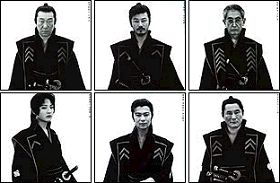
School daze. There's trouble brewing at the Shinsen samurai academy...
dir-scr Nagisa Oshima
with Beat Takeshi, Ryuhei Matsuda, Shinji Takeda, Tadanobu Asano,
Yoichi Sai, Jiro Sakagami, Masa Tommies, Tomoro Taguchi,
Masato Ibu, Koji Matoba, Kazuko Yoshiyuki, Zakoba Katsura
release US 6.Oct.00; UK 3.Aug.01
Canal+
99/Japan 1h40

Quiet and almost plaintive, the film gently recreates the period with impeccable detail. It looks fantastic, and the characters come to life with real drama and humour. Visually, everything is muted browns and greys interrupted by a gush of blood or a vivid crimson-gowned geisha. And the gays-in-the-military debate gets a subtle yet thorough working over without any heavy moralising. The whole thing builds quietly and steadily to a high noon duel that reveals the last of the plot's secrets. While increasingly interesting, the film is oddly constructed with an internal monologue narration plus extensive written titles to tell us everything that's going on. Both are unnecessary, so they must have some stylistic purpose that's lost on Western audiences. The acting is also uneven; most are very good, especially Takeshi with his trademark wry understatement, but Matsuda is oddly expressionless at the film's centre. As a result, the big climax leaves us rather cold and perplexed. Yes, it's lovely, but what's it all about really?
| themes, violence |

| 30.Jul.01 |
